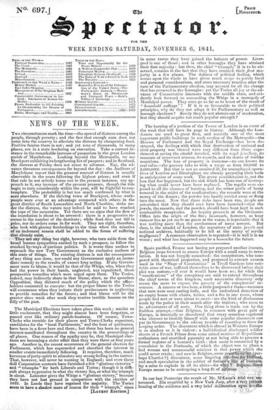The Municipal Elections have taken place this week ; amidst
so little excitement, that they might almost have been forgotten, or passed over like ordinary parish-business. Of course, Town- Clerks who tremble for their places and Town-Clerks expectant, candidates for the "local Parliaments," and the host of quidnuncs, have been in a fever here and there ; but there has been no general interest manifested throughout the country in the proceedings of all places. One reason of ths apathy may be, that Municipal elec- tions are becoming a staler affair than they were three or four years ago. Another is the recent occurrence of the general election for Parliament, which has superseded and absorbed the interest in smaller events immediately following. It requires, therefore, much keenness ofparty-spirit to stimulate any strong feeling in the matter. That, however, will never be wanting in England ; and even these dull Corporation contests have furnished a few "glorious victories" and" triumphs" for both Liberals and Tories; though it is difff- cult always to perceive in what the victory lies, or what the triumph is about. Leicester gives the Whigs a "glorious victory," because they have not lost ground in comparison with the election of 1835. In Leeds they have regained the majority.. The Tories seem to have a shadow more of reason for their "triumph," since in some towns they have gained the balance of power. Liver- pool is one of those ; and in other boroughs they have attained their first majority : but then, the chief "triumph," it is to be ob- served, consists in the fact that they have attained their first ma- jority in a few places. The dulness of political feeling, which seems upon the whole to have given much scope to purely local and personal considerations, and some necessary reaction after the turn of the Parliamentary election, may account for all the change that has occurred in the boroughs : yet the Tories all joy at the ad- vance of Conservative interests with the middle class, and evi- dently look forward to succeeding the Whigs in a monopoly of Municipal power. They even go so far as to boast of the result of "house/sold suffrage" ! If it is so favourable to their political principles, why do they not adopt it for Parliamentary as well as borough elections ? Surely they do not abstain out of moderation, lest they should acquire too much popular strength ?


























